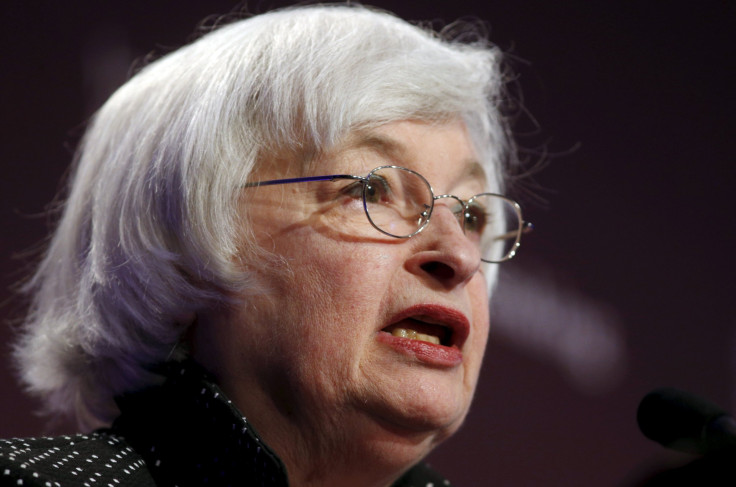Janet Yellen Speech: 3 Takeaways From Federal Reserve Chair’s Speech On The US Economy In 2015

Economy watchers got some key clues Friday as to the timing of the U.S. central bank's next interest rate hike. U.S. Federal Reserve Chair Janet Yellen spoke about the state of the U.S. economy at the Greater Providence Chamber of Commerce in Providence, Rhode Island. As part of the talk, Yellen dropped a few hints about interest rates, which have hovered near historic lows since the global financial crisis. She also expressed some concerns about missing ingredients in the current U.S. economic recovery.
Here are the three main takeaways from Yellen’s speech:
1. The Fed will definitely hike rates in 2015. Yellen warned that delaying action to tighten monetary policy until U.S. employment and inflation reach the central bank’s targets would risk overheating the economy.
If the economy continues to improve, as I expect, I think it will be appropriate at some point this year to take the initial step to raise the federal funds rate target and begin the process of normalizing monetary policy,” Yellen said.
To support taking this step, the central bank will need to see a continuation of improvement in labor market conditions. With oil prices stabilizing, Yellen also expects consumer price inflation will move up to the Fed's 2 percent target as the economy strengthens further. Data released Friday morning showed the Core Consumer Price Index, which excludes volatile components such as food and energy, gained 0.3 percent in April, the biggest monthly gain since January 2013.
The Fed chair noted that the slowdown in the U.S. economy in the first three months of the year may just be “statistical noise,” due to weather and the West Coast port disputes. Broadly, the Fed expects the economy to continue strengthening this year, and most economists anticipate the central bank will announce raising rates at the Federal Open Market Committee's two-day policy meeting on Sept. 16-17.
2. The plan is to gradually "normalize" rates. The Fed’s objectives of maximum employment and price stability are best achieved by proceeding cautiously, Yellen said.
After we begin raising the federal funds rate, I anticipate that the pace of normalization is likely to be gradual. The various headwinds that are still restraining the economy, as I said, will likely take some time to fully abate, and the pace of that improvement is highly uncertain," Yellen said. "It will be several years before the federal funds rate would be back to its normal, longer-run level.”
However, if economic conditions improve more rapidly than expected, the central bank could raise interest rates more quickly.
3. Yellen thinks you should be working harder, but she concedes you probably deserve a pay raise. Recent wage and productivity data have been “disappointing,” Yellen said, as U.S. wage growth remains relatively weak.
The most important factor the Fed uses to determine U.S. living standards is productivity growth, or increases in how much can be produced in an hour of work. Sustained increases in productivity are necessary to support rising incomes over time.
The growth rate of output per hour worked in the business sector has averaged about 1.25 percent per year since the recession began in late 2007, down from gains averaging 2.75 percent over the preceding decade, Yellen said.
I have mentioned the tepid pace of wage gains in recent years, and while I do take this as evidence of slack in the labor market, it also may be a reflection of relatively weak productivity growth,” Yellen said. “I do believe that, as a nation, we should be pursuing policies to support longer-run growth in productivity.”
Jessica Menton is a writer who covers business and the financial markets. News tips? Email me here. Follow me on Twitter @JessicaMenton.
© Copyright IBTimes 2024. All rights reserved.












